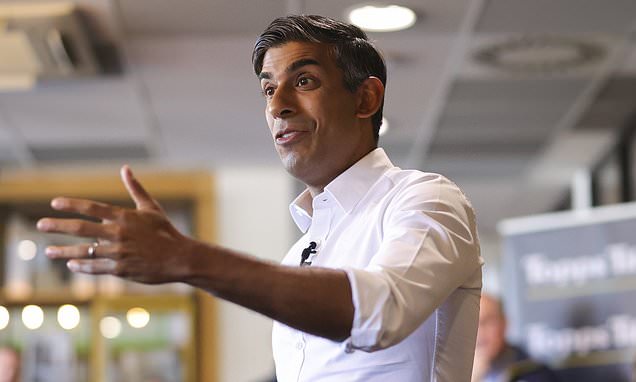
DAILY MAIL COMMENT: Inflation falling, now PM must drive growth
The news that inflation has fallen to 6.8 per cent – its lowest level for 18 months – will bring some sense of relief to hard-pressed families.
Thanks to the gradual easing of food and energy prices, it has now dropped by 4.3 percentage points since October. Good news, certainly, but let’s not put out the bunting just yet.
Even 6.8 per cent is still far too high, and the Institute for Fiscal Studies believes it could stay at around 6 per cent for some months. In January, Rishi Sunak pledged to halve inflation, which was then 10.7 per cent, by the end of the year. If the IFS forecasts are correct, the pledge remains a challenge.
More importantly, the ‘stickiness’ of UK inflation may discourage the Bank of England from bringing down interest rates, which have soared from 0.1 per cent in December 2021, to 5.25 per cent.
This rapid increase sent the housing market into reverse and brought financial misery to millions of mortgage holders. Yet it could have been avoided if the Bank had done its job properly.
Economic growth is weak, and if the PM is to kick-start the economic recovery the country craves, he needs to super-charge it
It continued quantitative easing (effectively printing money) for too long and failed to respond to inflation as it began to climb after the pandemic, when demand surged.
Had Governor Andrew Bailey increased the base rate earlier by small degrees, there may have been no need for the panic rises of recent months.
He may try to blame the war in Ukraine for the spike in inflation, but it was at a 30-year high before Putin’s invasion, suggesting he had already lost control. He should now pause, rather than inflicting yet more pain on borrowers with further rises.
Another of Mr Sunak’s five pledges was to grow the economy, and figures released last week showed that while Germany stalls on the edge of recession, the UK is growing.
But that growth is weak, and if the PM is to kick-start the economic recovery the country craves, he needs to super-charge it.
Public sector strikes have held Britain back, as has the growing number of people languishing on long-term sick, who act as a drag on growth and productivity.
Also, the fact that so many civil servants have refused to return to their desks after the pandemic has led to a sense of sloth and dysfunctionality at the heart of government.
But perhaps the biggest problem is the crippling tax burden on families and businesses – the highest since the 1950s. High taxes disincentivise enterprise, initiative, and hard work – the main drivers of growth. A Tory government should know that without having to be told.
The joke’s over
The Edinburgh Fringe was once famous for pushing the boundaries of comedy. Today, it seems, only acts conforming to a dreary woke orthodoxy are welcome there.
By dropping a stand-up show starring brilliant Father Ted creator Graham Linehan after complaints about his supposedly ‘gender-critical’ views, the Leith Arches venue has succumbed to cancel culture.
If comedians are no longer allowed to offend, satire really is dead – and the raison d’etre of the Fringe along with it.
By dropping a stand-up show starring Graham Linehan after complaints about his supposedly ‘gender-critical’ views, the Leith Arches venue has succumbed to cancel culture
Pride of Lionesses
Could it really be that football is coming home at last? After 57 barren years, England has made it to a world football final.
As a result of their thrilling win over hosts Australia, the Lionesses play Spain in Sydney on Sunday, hoping to add the Women’s World Cup to the European trophy they already hold.
They carry the hopes of a nation on their shoulders and victory would, of course, be the ultimate accolade. But win or lose, they have already made us proud.
Source: Read Full Article

